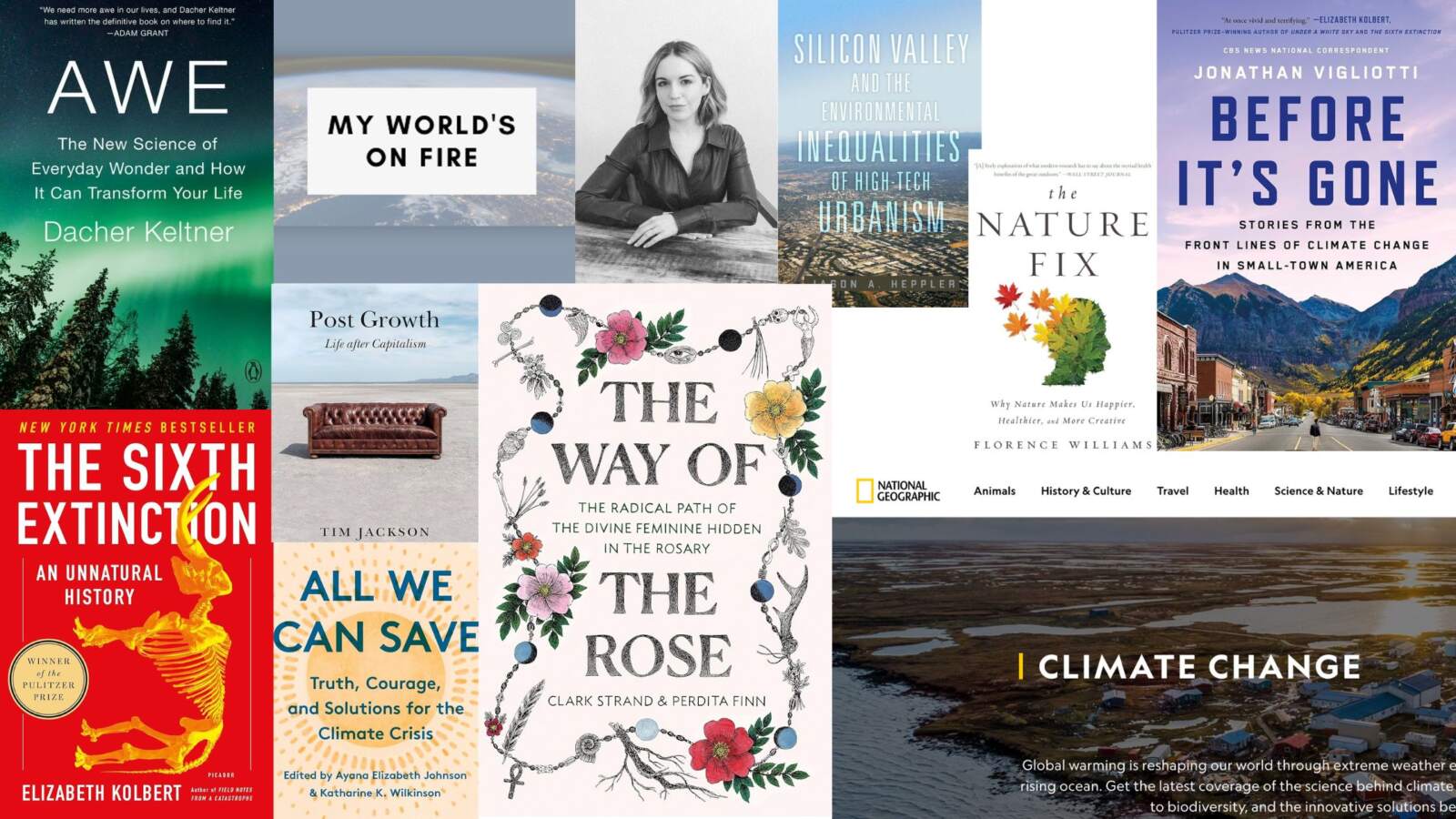I read a number of climate newsletters, news articles, and journal articles everyday to stay on top of timely information in the field of climate communication. Often these are dense, science-heavy materials so it was fun to recently crack open a book that considers the environment from a very different angle. The Way of the Rose: The Radical Path of the Divine Feminine Hidden in the Rosary, recommended to me by dear friend and climate advocate Rabbi Leah Julian, is a well-sourced book that has expanded my understanding of historical connections between the figure of the mother and care for Earth.
Allison, Director
Elizabeth Kolbert’s The Sixth Extinction won a Pulitzer Prize over a decade ago, but I only got around to buying a copy this summer. Day one, flipping through the first chapter, I just couldn’t fathom why I hadn’t read it sooner.
For the evolutionary biology nerd in me, this book was a “paradigm shift,” a dramatic change in my understanding of our current extinction crisis and how we got here. The writing was so good that my head buzzed with Kolbert’s insights long after I put the book down. For anyone who wants to understand the history of Homo sapiens’ impact on other species, this book is simply perfect.
I am also highly inspired by Oxford data scientist Hannah Ritchie’s thoughtful approach towards climate solutions in her Sustainability by Numbers newsletter. And I love reading everything Joe Brown and Corinne Iozzio publish at one5c –– their “The Mess” series is just so personal and provocative, and I always eagerly wait for the next column.
Rhysea, Engagement Coordinator
Lately, I’ve found myself diving into National Geographic articles on the environment and climate change. I’ve always appreciated their visual storytelling through documentaries, magazines, and their articles. Their coverage spans health, science, history, wildlife, and more. One piece that recently stayed with me was a feature on the 20th anniversary of Hurricane Katrina, one of the most devastating storms in U.S. history.
I often seek out readings that help me reconnect with my own relationship to nature, especially after consuming so many stories of loss and destruction. Back in January’s The Planet Media Summit, hosted at USC in collaboration with CCJC and The Aspen Institute, one of the panelists recommended the book: Awe: The New Science of Everyday Wonder and How It Can Transform Your Life by Dacher Keltner. It’s a fascinating exploration of the emotion of awe and how intentionally cultivating it can enrich our lives. I enjoyed reading a chapter every night, and it became a gentle, grounding way to close my evenings.
Most recently, a friend recommended Jonathan Vigliotti’s, Before It’s Gone: Stories from the Front Lines of Climate Change in Small-Town America. I’m eager to read it this fall, as I’ve been especially drawn to personal stories of everyday people that bring the realities of climate change closer to home.
Pawan, Program Administrator
Currently reading this for my research, super interesting hearing what silicon valley was and what it is today and how that natural landscape has shifted: Jason A. Heppler’s, Silicon Valley and the Environmental Inequalities of High-Tech Urbanism.
Natalie, Research Assistant/Associate Producer
If you’re a fashion enthusiast, or a consumer of clothes in any capacity, you should definitely check out Sustainable Fashion Friend’s Substack for deep-dives into brands who are making strong claims about sustainability but (spoiler alert) are often not following through.
As an Econ nerd at heart, I also loved Post Growth by Tim Jackson, where he argues that “the relentless pursuit of more” that is so intrinsic in capitalism has not only led to social inequality and financial instability but also, a climate crisis.
Finally, The Nature Fix: Why Nature Makes Us Happier, Healthier and More Creative, by Florence Williams and All We Can Save: Truth, Courage, and Solutions for the Climate Crisis, edited by Ayana Johnson and Katharine K. Wilkinson both have a place in my heart for being such powerful works of art that emphasize the connection between nature/ mother earth/ climate activism and our mental health/ search for joy and meaning in this world.
Nadia, Research Assistant
Colleen Hagerty’s My World’s on Fire newsletter is a great look behind the scenes of her award-winning reporting on climate and natural disasters, including a deeper dive into U.S. emergency alerts and warnings, as well as a round-up of powerful coverage of Hurricane Katrina’s 20th anniversary.
Mallory, Senior Producer
I’ve also been very curious about the lasting impact of colonial history on different aspects of our world, and Amitav Ghosh’s The Nutmeg’s Curse has been such an eye-opener. It’s a haunting retelling of the climate crisis, seen through the lens of British colonial exploitation in India and its grip on our present. It felt even more powerful reading it as an Indian, where Ghosh masterfully entwines history, memory, and deep ecological wisdom to narrate an incredible tale of loss, justice and reclamation.
Anahita, Research Associate
